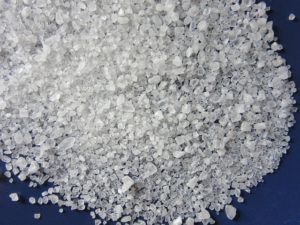No mineral is more central to human life and health than salt. It is essential in regulating hydration in the body’s cells. One quarter of our taste buds are dedicated to tasting it.
Even our language reflects the importance of salt: good people are the salt of the earth, a competent person is worth their salt, and sketchy information should be taken with a grain of salt.
Throughout most of history, humans have needed to find sources of salt to supplement their diet. Modern people have a different problem: too much salt, which can lead to many health problems.
If you’re going to be monitoring your salt intake (and I recommend you do), why not choose a salt that provides health benefits beyond the basics? Why not use the immensely beneficial sea salt instead of regular table salt?
Salty options: what’s the difference?
Table salt is typically mined from salt deposits or evaporated from brine, and then processed by manufacturers first to remove other minerals and then to add ingredients such as iodine and anti-caking agents.
Sea salt is produced by evaporating sea water and then collecting the resulting salt crystals. While some sea salt companies process sea salt to remove trace minerals, unrefined sea salt leaves these minerals intact. And that makes all the difference.
Pinch me, I’m dreaming
It’s incredibly easy to start taking advantage of the benefits of sea salt: use it in place of table salt.
Unrefined sea salt contains anywhere from 60 to 90+ trace minerals, depending on where it was harvested. These minerals include:
- Potassium, for a healthier heart
- Zinc, to strengthen your immune system
- Magnesium, required for a healthy nervous system
- Calcium, for stronger bones
Even better, sea salt typically has a stronger flavor than table salt, meaning you can still have great-tasting food while lowering your sodium intake!
Music to your mouth
Sea salt is a friend to your mouth even outside the kitchen.
A mix of ½ to ¼ tsp. of sea salt per cup of water, when gargled, can have numerous, surprising benefits for your oral health, including:
- Reducing ulcers
- Alleviating sore throats and toothaches
- Reducing bad breath
Looking for more? How about using sea salt and natural baking soda as your toothpaste? The fluoride that’s found naturally in unrefined sea salt will help strengthen your teeth, while the salt and baking soda will gently clean and whiten them.
Wash, Rinse, Repeat
Ask anyone who’s been swimming in the ocean about the benefits of sea water on both the skin and hair. Well, you can bring that power home with you every day without a visit to the beach.
Sea salt’s natural antiseptic qualities make it ideal for removing unwanted bacteria from your skin and scalp.
Sea Salt Skin Wash
Mix a quarter-cup salt and a half-cup olive oil or softened coconut oil into a thick paste. If desired, add 10 drops of your favorite essential oil. Apply in the shower with a washcloth, loofah, or the palms of your hands, gently scrubbing your skin in a circular motion.
Recipe source: http://www.womenshealthmag.com/beauty/salt-beauty-uses
Sea Salt Bath
A simple way to cleanse your body (and your mind) after a day of exertion is a soothing sea salt bath. One cup of sea salt added to an evening soak will not only soothe your mind and prepare you for sleep, but reduce inflammation from skin irritants. It’s also incredibly beneficial for people suffering from skin conditions such as psoriasis and eczema!
Interested in more?
- Learn the fascinating history of how salt has shaped human civilization in the bestselling book Salt by Mark Kurlansky.
- Get started using sea salt with this delicious and incredibly healthy Kale and Carrot Salad.
- Michael Pollan is a leading advocate of eating unprocessed foods. Learn more about how unprocessed foods, including natural sea salt, are better for you.


